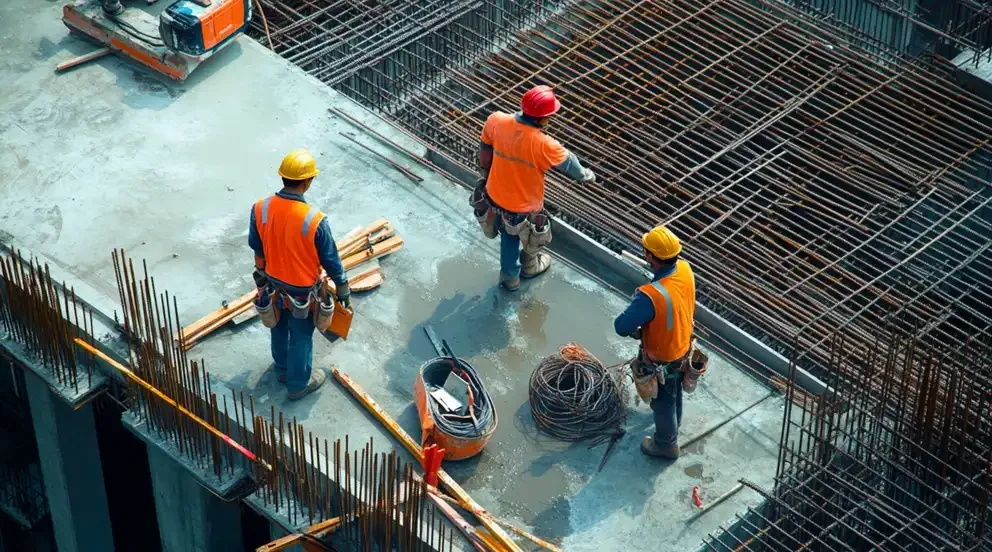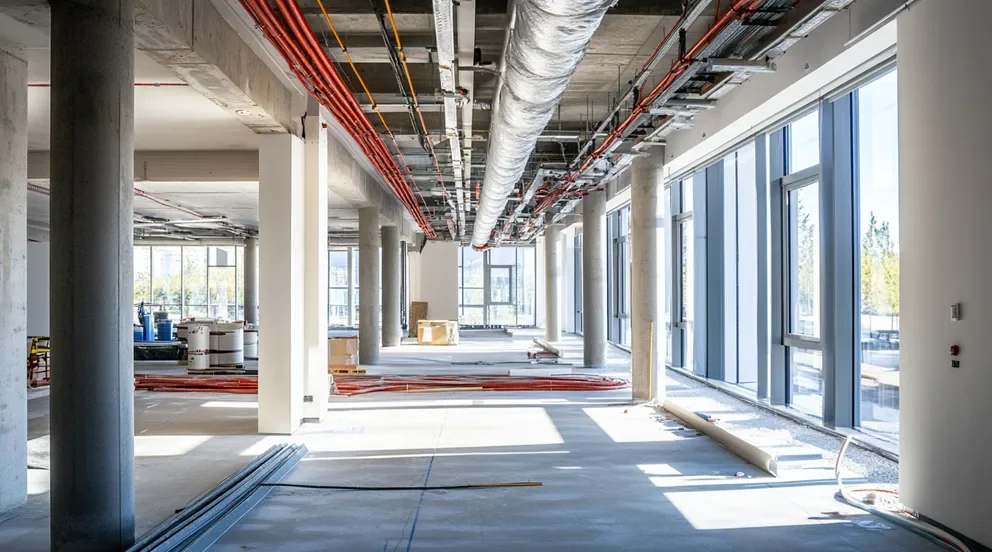Keeping an HVAC business running smoothly depends on more than just skilled technicians—it requires a dispatcher who keeps everything on track. HVAC dispatchers are the command center of every job, coordinating schedules, managing technician routes, and handling last-minute changes without slowing down operations. They’re the ones making sure no time is wasted and every service call gets handled as efficiently as possible.
A skilled dispatcher keeps field teams productive and customers happy—all while balancing a nonstop flow of calls, updates, and urgent requests. In this guide, we’ll cover everything you need to know about HVAC dispatching, including:
- What is an HVAC dispatcher?
- What does a successful HVAC dispatcher do?
- How to become an HVAC dispatcher
- What software & tools do HVAC dispatchers typically use?
- 5 best software for HVAC dispatchers
Every HVAC job starts with a call, but it’s the dispatcher who turns that request into a completed service visit. They schedule, assign, and coordinate every move, ensuring technicians are in the right place at the right time with the right tools. Let’s break down exactly what an HVAC dispatcher is.
What is an HVAC dispatcher?
An HVAC dispatcher coordinates service calls, assigns jobs to technicians, and manages their schedules to ensure efficient operations. They communicate with the customers, optimize routes, and handle urgent requests, making sure technicians arrive prepared, and on time to complete each job.
A great HVAC dispatcher is more than a scheduler—they’re the link between customers, field technicians, and the office. By prioritizing service calls, tracking job progress, and adjusting schedules in real-time, they help maximize efficiency, reduce downtime, and keep both customers and technicians satisfied.
What does a successful HVAC dispatcher do?
A successful HVAC dispatcher keeps technicians on schedule, reduces downtime, and ensures customers receive timely service. They anticipate scheduling conflicts, adjust routes in real time, and communicate clearly with both technicians and customers to prevent delays. Their ability to stay organized and proactive keeps operations running smoothly. Mastering HVAC scheduling & dispatching helps dispatchers optimize workflows, prevent bottlenecks, and improve overall efficiency.
They also handle unexpected situations—like emergency calls or last-minute cancellations—without disrupting the entire day's workflow. By balancing efficiency with flexibility, they help maximize billable hours while minimizing wasted trips. The best dispatchers know their technicians' strengths and assign jobs accordingly to boost productivity.
What are the main responsibilities of an HVAC dispatcher?
An HVAC dispatcher plays a critical role in keeping operations smooth, ensuring technicians are where they need to be with everything required to complete each job. Their responsibilities go beyond scheduling—they manage logistics, communication, and efficiency.
Here are the 10 key responsibilities of an HVAC dispatcher:
- Scheduling & assigning jobs – Matching the right technician to each job based on skills, location, and availability
- Route optimization – Mapping out the most efficient routes to minimize travel time and fuel costs
- Customer communication – Confirming appointments, providing ETA updates, and handling reschedules
- Technician coordination – Keeping techs informed with job details, special instructions, and parts needed
- Emergency handling – Adjusting schedules on the fly to accommodate urgent service calls
- Workload management – Balancing technician assignments to prevent burnout and maximize efficiency
- Data entry & reporting – Logging completed jobs, tracking service trends, and updating customer records
- Parts & inventory coordination – Ensuring technicians have the necessary tools and parts before dispatching
- Billing & job documentation – Collecting job details, ensuring service forms are completed, and assisting with invoicing
- Compliance & safety monitoring – Ensuring technicians follow company policies, safety regulations, and licensing requirements
How does an HVAC dispatcher coordinate effectively with field technicians and customers?
Clear and consistent communication is key. Dispatchers use phone calls, text messages, or dispatch software to keep technicians updated on job details, changes, and special instructions. Real-time tracking allows them to adjust routes or reassign jobs when needed, ensuring no time is wasted. Using a well-structured HVAC dispatcher script can help streamline conversations, ensuring technicians and customers receive the right information efficiently.
With customers, dispatchers provide accurate arrival times, send reminders, and handle rescheduling requests. They also relay technician updates to manage expectations. Strong coordination means fewer delays, better service, and a smoother workflow from start to finish.
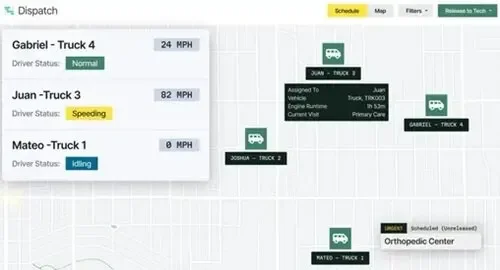
Great dispatchers need great software
Get on top of HVAC dispatching with BuildOps efficient dispatching.
How does an HVAC dispatcher contribute to customer satisfaction?
An HVAC dispatcher directly impacts the customer experience by ensuring service calls are handled efficiently and on time. When schedules are well-organized, customers don’t deal with long wait times, missed appointments, or last-minute cancellations.
They also act as a customer’s point of contact, providing updates and quick solutions when issues arise. A dispatcher who prioritizes urgent jobs, communicates clearly, and keeps things running smoothly helps build trust, leading to repeat business and positive reviews.
How to become an HVAC dispatcher
In North America, an HVAC dispatcher needs a high school diploma or GED, with a background in office administration, customer support, or technical operations. While formal education isn’t mandatory, knowledge of HVAC systems, dispatching software, and technician workflows is essential.
Success in this field depends on strong communication, real-time problem-solving, and the ability to manage complex scheduling demands under pressure. As dispatchers gain experience, they can move into senior dispatcher, operations manager, or service coordinator roles in larger HVAC companies. The ability to coordinate technicians efficiently, manage high-volume service calls, and optimize scheduling processes makes HVAC dispatchers an integral part of a successful service operation.
What is a common HVAC dispatcher salary?
In the United States, HVAC dispatchers are essential in coordinating service calls and managing technician schedules. According to the U.S. Bureau of Labor Statistics, as of May 2023, the mean annual wage for dispatchers, excluding police, fire, and ambulance, is $46,650. Salaries can vary based on factors such as location, experience, and company size.
What qualifications or certifications are required to become an HVAC dispatcher?
An HVAC dispatcher in North America typically needs a high school diploma or GED, along with experience in customer service, administration, or HVAC operations. While formal education beyond high school isn’t required, employers look for candidates who are organized, detail-oriented, and capable of multitasking in fast-paced environments. Many dispatchers gain experience by working in HVAC office roles, technician support, or service coordination before transitioning into dispatching.
Certifications aren't legally required, but specialized training programs can enhance career opportunities. Some reputable training options include:
- Lennox Learning Solutions – Learn HVAC training essentials from an industry leader with expert instructors.
- HVAC Excellence – Offers nationally recognized certifications and training focused on technical excellence.
- North American Technician Excellence (NATE) – Provides widely recognized certifications covering HVAC industry standards and best practices.
- EPA Section 608 Certification – Required training on refrigerant handling for compliance with EPA regulations.
- ASHRAE Certification – Provides training and certifications that emphasize HVAC system standards, efficiency, and sustainability.
Employers also prefer candidates familiar with dispatch management software, OSHA safety standards, and technician licensing requirements, especially for commercial HVAC roles. With the right experience and training, dispatchers can advance into senior positions in larger HVAC organizations.
What qualities would a prospective HVAC dispatcher need to have?
An HVAC dispatcher must be highly organized and detail-oriented, able to manage multiple service calls, coordinate technicians, and adjust schedules in real time. Task management and prioritization skills are essential, as dispatchers must quickly assess urgent jobs while keeping the daily workflow efficient. Strong problem-solving skills help them handle last-minute cancellations, emergencies, and unexpected delays without disrupting operations.
Excellent customer service skills are also critical. Dispatchers are often the first point of contact for customers, so a pleasant phone demeanor, clear verbal communication, and professionalism go a long way in ensuring a positive experience. They should also be comfortable using HVAC dispatching software, phones, and other office equipment while maintaining accurate records. Familiarity with HVAC/R terminology is a plus, but a willingness to learn industry-specific language and processes is just as important.
Common HVAC dispatcher interview questions
Hiring managers for HVAC dispatcher roles look for candidates who can handle high-pressure scheduling, customer service, and technician coordination while keeping operations running smoothly. Expect a mix of technical, behavioral, and situational questions to assess your problem-solving skills, communication, and ability to prioritize tasks.
Here are some of those possible questions:
- How do you handle scheduling conflicts when multiple service calls need immediate attention?
- Can you describe a time when you had to deal with an angry customer? How did you resolve the situation?
- What steps do you take to ensure technicians arrive at job sites prepared with the right tools and parts?
- How do you stay organized when managing a high volume of service calls and technician schedules?
- What dispatching software have you used before, and how comfortable are you with learning new technology?
- How would you prioritize emergency service calls versus routine maintenance appointments?
- Two urgent service calls came, and one only technician is available. How do you decide which call to prioritize, and why?
- How do you communicate with both technicians and customers to keep everyone informed of job status updates?
- What strategies do you use to optimize technician routes and reduce travel time?
- Why do you want to work as an HVAC dispatcher, and what makes you a strong fit for this role?
What software & tools do HVAC dispatchers typically use?
HVAC dispatchers rely on a range of tools to efficiently manage service calls, technician schedules, and customer communication. The right software streamlines operations, reduces response times, and helps maximize productivity. Here are the key types of tools HVAC dispatchers use:
- Dispatching & Scheduling Software – This is the core tool for managing service calls, assigning jobs to technicians, and tracking their real-time status. It helps prevent scheduling conflicts and optimizes routes to reduce downtime.
- Customer Relationship Management (CRM) systems – A CRM stores customer information, service history, and job details. This allows dispatchers to quickly access records, provide accurate ETAs, and improve customer service.
- GPS & Fleet Tracking Tools – These tools monitor technician locations and vehicle statuses, helping dispatchers assign jobs more efficiently and adjust schedules based on real-time conditions.
- Communication Platforms – Whether through VoIP phone systems, messaging apps, or integrated chat tools, seamless communication between dispatchers, technicians, and customers is essential for keeping service calls on track.
- Invoicing & Payment Processing Software – Many HVAC companies integrate billing tools to streamline invoicing, collect payments faster, and reduce administrative workload for dispatchers managing completed jobs.
Expert Tip
If you're an HVAC dispatcher, you need an HVAC dispatch software built for real-life scheduling challenges—not something made for generic office tasks. It needs to handle everything from emergency call-outs to technician tracking and invoicing, all in one place.
With so many software options available, choosing the right platform depends on the size of the HVAC company and its operational needs. The next section breaks down the best HVAC dispatcher software to help streamline scheduling, dispatching, and communication.
5 best software for HVAC dispatchers
Efficient HVAC dispatching software helps businesses streamline job scheduling, technician coordination, and customer communication. The right platform can reduce delays, optimize routes, and improve overall service efficiency. Below are five of the best options for HVAC dispatchers.
1. BuildOps
BuildOps is a comprehensive dispatching platform built specifically for commercial HVAC businesses. It offers real-time job scheduling, GPS-enabled technician tracking, and seamless communication tools. With an all-in-one platform, BuildOps integrates dispatching, invoicing, reporting, and customer management, eliminating the need for multiple software solutions. Its advanced automation features help HVAC companies improve response times and maximize productivity.
How Pricing Works: BuildOps provides live demos each week, allowing businesses to explore its features and determine the best fit for their needs. You can schedule a demo at your convenience to see the platform in action.
Best For: Commercial
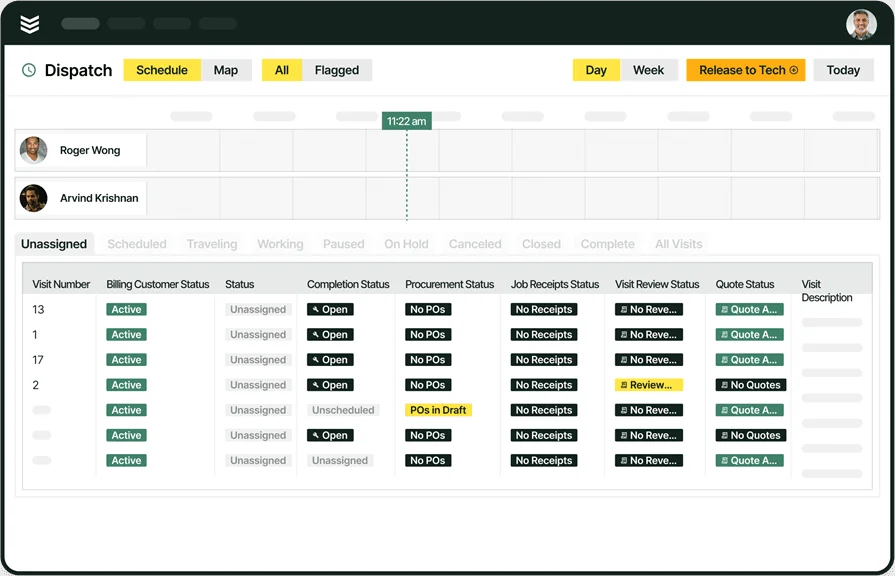
Explore BuildOps dispatch software
Streamline commercial HVAC operations and dispatch the right tech to the job.
2. Housecall Pro
Image Source: Housecall Pro
Housecall Pro is an HVAC software platform designed for both residential and commercial contractors, with a strong focus on customer relationship management (CRM). It allows dispatchers to store detailed customer histories, automate follow-ups, and streamline communication to improve customer retention. The platform also integrates with marketing tools, helping businesses manage service agreements and repeat business.
However, Housecall Pro lacks advanced job costing and reporting features, which can be limiting for larger HVAC businesses that need deeper financial insights.
How Pricing Works: Housecall Pro operates on a subscription-based model, with pricing tiers depending on the number of users and features included.
Best For: Residential
3. Jobber
Image Source: Jobber
Jobber is an HVAC service management tool that excels in GPS tracking and fleet management. Dispatchers can monitor technician locations in real-time, optimize routes to reduce travel time, and provide accurate ETAs to customers. It also includes automated job scheduling and invoicing, making it a well-rounded choice for field service businesses.
Despite its strengths, Jobber’s automation features are more limited compared to other platforms, which may not be ideal for companies looking to fully streamline dispatching and scheduling processes.
How Pricing Works: Jobber offers monthly and annual subscription plans, with pricing based on the number of users and features selected.
Best For: Commercial, Residential
4. FieldEdge
Image Source: FieldEdge
FieldEdge is an HVAC dispatching solution focused on real-time communication between dispatchers, technicians, and customers. The platform enables instant messaging, live job updates, and call tracking, allowing businesses to provide faster response times and better service coordination. Its mobile app ensures technicians receive the latest job details and updates in the field.
While FieldEdge is great for communication, it lacks built-in GPS tracking and fleet management tools, requiring third-party integrations for those features.
How Pricing Works: FieldEdge offers custom pricing, with costs varying based on company size and selected features.
Best For: Commercial, Residential
5. ServiceFusion
Image Source: ServiceFusion
Service Fusion is an HVAC software platform specializing in invoicing and payment processing. It allows businesses to generate estimates, process payments, and manage billing efficiently. With its built-in financial tools, dispatchers can track completed jobs, send invoices instantly, and integrate with QuickBooks for streamlined accounting.
However, Service Fusion’s reporting and analytics features are not as comprehensive as other platforms, which may be a drawback for companies needing deeper operational insights.
How Pricing Works: Service Fusion follows a flat-rate pricing model, making it more predictable for businesses managing multiple users.
Best For: Commercial, Residential.
HVAC dispatchers are the backbone of any service operation, juggling schedules, coordinating technicians, and handling customer expectations—all in real-time. Their ability to prioritize jobs, optimize routes, and communicate effectively makes the difference between a smooth-running day and a chaotic one. But even the most skilled dispatcher needs the right tools to keep up with high-volume service calls and last-minute changes.
Most dispatching software focuses on just one piece of the puzzle—whether it's scheduling, GPS tracking, or invoicing. The challenge is finding a solution that brings everything together into one seamless platform. That’s where BuildOps stands out, offering real-time scheduling, technician tracking, customer management, and invoicing all in one place. It’s designed for the demands of commercial HVAC dispatching, making it easier to manage every job from start to finish.
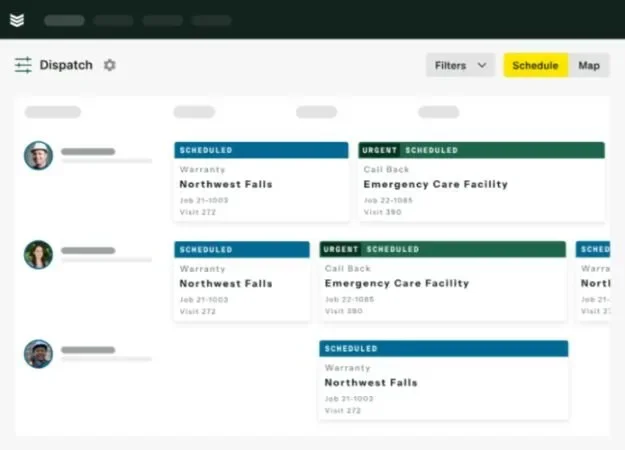
Demo BuildOps Dispatching
Stay in control of projects and make sure jobs are done on time — every time.





